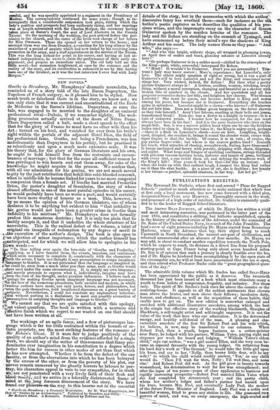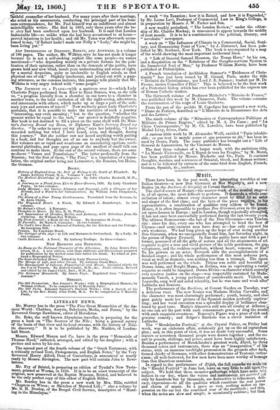PUBLICATIONS RECEIVED.
The Reverend Dr. Guthrie, whose first and second "Pleas for Ragged Schools" excited so much attention as to make national that which was at first only a local movement, has now come forward with a third plea, designated SEED-TIME AND HARVEST. Thoroughly earnest in the work, and possessed of a high order of intellect, Dr. Guthrie is eminently quali- fied to be the leader of Ragged School literature.
The Ancric Boar JOURNEY, of which Dr. Hayes has written a vivid and most interesting narrative, was performed in the latter part of the year 1854, and constitutes a striking, but hitherto unpublished, episode in the history of the second cruise of the Advance, under the command of Dr. Kane of the United States Navy, in search of Sir John Franklin. The boat's crew of eight persons including Dr. Hayes started from Rensselaer Harbour, where the Advance then lay, their object being to reach Upernavik in North Greenland, the nearest out-post of civilization, and returned unsuccessful after an absence of four months. Dr. Hayes, we may add, is about to conduct another expedition towards the North Pole, which he expects to reach, its distance in a direct line from his proposed starting-point at Cape Frazer being only about seven hundred miles. Dr. Rae is of opinion that such a journey is clearly feasible over the ice, and if Dr. Hayes be hindered from accomplishing it by the open state of the circumpolar sea, he will at least have ascertained that the sea is open, and thus solved what Professor Bache calls the "great geographical ques- tion of the day."
The admirable little volume which Mr. Smiles has called SELF-HELP has been appreciated by the public as it deserves. The twentieth thousand has just been issued of a book which must stimulate many a youth to form habits of temperance, frugality, and industry. Nor these only. The spirit of Mr. Smiles's book rises far above the counter or the counting-house. It appeals to all the noblest sentiments that elevate man above the brutes, and men above their fellows ; inculcates duty, honour, and obedience, as well as the acquisition of those habits, that enable men to get on. The new edition is somewhat enlarged and enriched with additional illustrative anecdotes, among which the best is the simple but effective story of the working blacksmith, Sharpies of Blackburn, a self-taught artist and self-taught engraver. It is not tbo value of the work that here wins our admiration. It is the determined energy, and healthy self-denial of the man. A pleasing and cha- racteristic anecdote of the first Sir Robert Peel and his wife which, we believe, is new, may be transferred to our columns. When Robert Peel, then a youth, began business as a cotton-printer near Bury, he lodged with his partner, William Yates, paying eight and sixpence per week for board and lodging. "William 'Yates's eldest child," says our author, "was a girl named Ellen, and she very soon be- came an especial favourite with the young lodger. On returning from his hard day's work at The Ground,' he would take the little girl upon his knee, and say to her, Nelly, thou bonny little dear, wilt be my wife ? ' to which the child wOuld readily answer, Yes,' as any child would do. Then I'll wait for thee, Nelly ; I'll wed thee, and none else.' And Robert Peel did wait. As the girl grew in beauty towards womanhood, his determination to wait for her was strengthened; and after the lapse of ten years—years of close application to business and rapidly increasing prosperity—Robert Peel married Ellen Yates when she had completed her seventeenth year ; and the pretty child, whom her mother's lodger and father's partner had nursed upon his knee, became Mrs. Peel, and eventually Lady Peel, the mother of the future Prime Minister of England. Lady Peel was a noble and. beautiful woman, fitted to grace any station in life. She possessed ram of mind, and was, on every emergency, the high-souled an&
aithful counsellor of her husband. For many years after their marriage, she acted as his amanuensis conducting the principal part of his busi- ness correspondence, for Mr. Peel himself was an indifferent and almost unintelligible writer. She died in 1803, only three years after the ba- n .etcy had been conferred upon her husband. It is said that London fashionable life—so unlike what she had been accustomed to at home— proved injurious to her health ; and old Mr. Yates was afterwards accus- tomed to say, if Robert hadn't made our Nally a "Lady," she might ha, been living yet.'"
ART IMPRE&SIONS OF DRESDEN, BERLIN, AND ANTWERP, is a volume of 180 pages. The author, Mr. Wilkins, says he has not made it longer because he is not a self-seeking sophist like some people—no names mentioned—" who depending mainly on a private fortune for the pub- lication of their opinions, rather than on the demands of the public, have grown bold and now blind, insult your understanding and sense of right,
ysieal one of old." Slightly incoherent, and jerked out with a gasp- s mental despotism, quite as intolerable to English minds, as that ing utterance, as the commas indicate, this passage tells plainly that Mr. Wilkins is very angry indeed with "some people."
The jourueny ox A PL,urn—with a mattress over it—which Lady Charlotte Pepys performed from Kiev to Eaux Bonnes, was, as she tells us, "a progress literally from a chamber in one town to a chamber in another town, to the total exclusion of all the sight-seeing, adventures, and intercourse with others, which make up so large a part of the ordi- nary joys and sorrows of travel." Now we freely grant Lady Charlotte's postulate, that it is possible to make the narrative of such a journey "interesting, nay even amusing ; " but to the question, "whether the present writer be equal to the task," our answer is decidedly negative. Her book is not destined to fill a place on the same shelf with De Mais- tre's Journey Round my Boom, or Alphonse Karr's Journey Round my Garden. "In order to carry out my plan," says her ladyship, "I have recorded nothing but what I have heard, seen, and thought, during this journey." But she neither saw nor heard anything worth putting in a book, and her thoughts are of no use to anybody but the owner. Her volumes are as vapid and wearisome as maundering egotism, senti- mental platitudes, and page upon page of the smallest of small talk can combine to make them. At the end of the second volume, there are some mediocre "Verses and Translations." The latter professedly from the Russian; but the first of them, "The Pine," is a translation of a trans- lation, the original author being not Lermontov, the Russian, but Heine, the German.
BOOKS.
History of England from the Fall of Wolsey to the Death of Elizabeth. By James Anthony Frond, M.A. Volumes V. and VI. The Medical _Knowledge of Shakespeare. By John Charles Bucknill, 31.D., Sm.
A Journey on a Plank from Kiev to Eaux-Bonnes, 1859. By Lady Charlotte Pepys. In two volumes. Lady Morgan: her Career, Literary and Personal, with a Glimpse of her Friends, and a Word to her Calumniators. By William John Fitzpatrick, J .P .
The Diary of a Poor Young Gentlewoman. Translated from the German, by M. Anna Childs.
The Wayward Heart. A NoveL By Edward I. Branthivayt. In two volumes.
Sir Rohan's Ghost. A Romance.
Thoughts in Metre. By Mrs. R. D. Walbey. Art Impressions of Dresden, Berlin, and Antwerp, with Selections front the Galleries. By William Noy Wilkins. My First Journal; a Book for the Young. By Georgiana M. Craik. _El Fureidis. By Maria S. Cummins. In two volumes. The Cook's Own Book: a Manual of Cookery, for the Kitchen and the Cottage. By Georgians Hill. Pansies. By Fanshawe Brook.
The Cottages of the Alps : or Life and Manners in Switzerland. By a Lady. In
two volumes.
Castle Richmond. A Novel. By Anthony Trollope. In three volumes.
NEW EDITIONS AND REPRINTS.
An _Essay on the National Character of the Athenians. By John Brown Pat- terson, M.A. A new edition, with large additions and illustrations prepared for publication by the Author some time before his death. To which is pre- fixed a Biographical Notice. The Semi-Detached House. Edited by Lady Theresa Lewis. The Mirage of Life, and other Poems. By Anthony Oneal Haye.
The Management of Infancy, Physiological and Moral. Intended chiefly for the Use of Parents. By Andrew Combe, 31.D., Ste. .Ninth edition. Revised and edited by Sir James Clark, Bart., M.D., &e.
The Bateman Household. By James Payn. Reprinted from "Chambers'
Journal."
SERIALS.
The Old Dramatists. Ben Jonson's Works: with a Biographical Memoir, by William Gifford. To be completed in 12 Monthly Parts. The Old Poets. Edmund Spenser's Poetical Works ; with a Sketch of his Life, by the Rev. Henry John Todd, M.A. To be completed in 9 Monthly Parts.



























 Previous page
Previous page